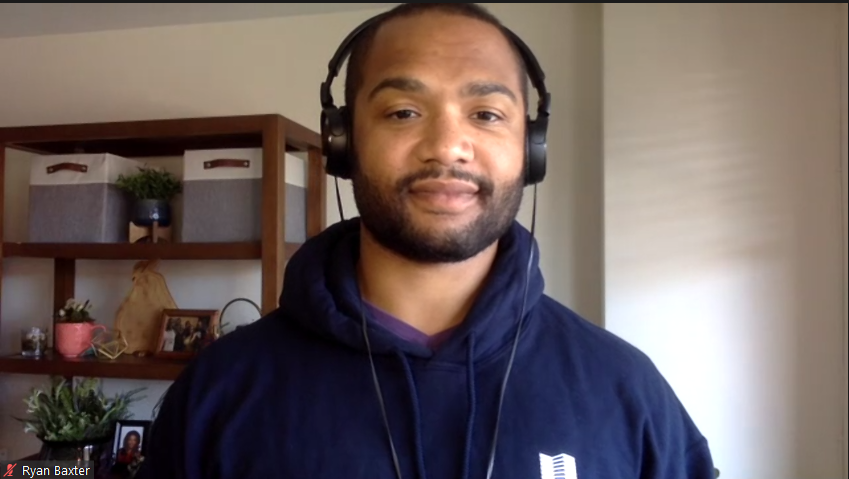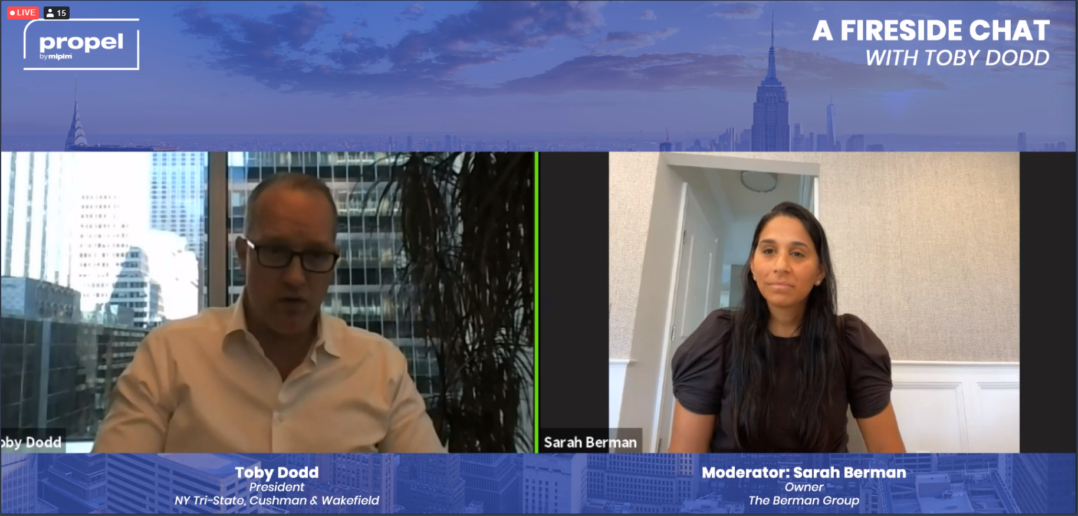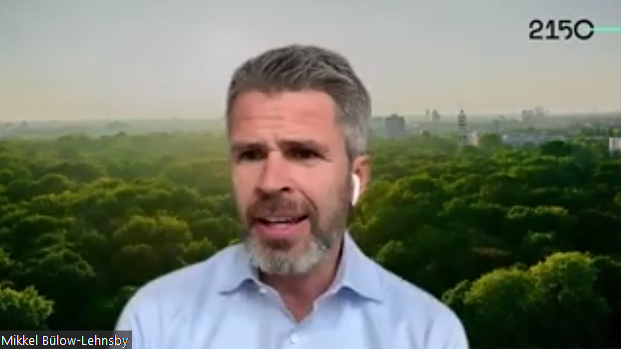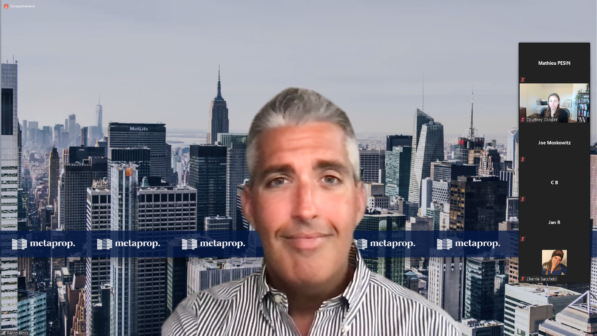As the world of work continues to be transformed by technology, day two of the Propel Networking Summit saw sector experts discuss both the office revolution and the future of climate tech solutions
The future of the office came under scrutiny on day two of the Propel Networking Summit, with an exploration of proptech’s capacity to enhance relationships and support sustainability drives.

Ryan Baxter, Proptech Advisor, NYSERDA
Francisco Acoba, Principal, Ernst & Young US LLP went head-to-head with Jacinda Lofland, Director, Strategy & Innovation, Nuveen, Ryan Baxter, Proptech Advisor, NYSERDA and Scott Leibold, EVP and Global Head of Purchasing & Property, RELX Inc to discuss how landlords can better embrace the future in terms of office design.
Said Leibold: « We’re starting to see more and more landlords being increasingly proactive on tenant needs. Twenty years ago, that was non-existent. It definitely is changing, it’s changing for the better, and we all need to work together to move things forward. »
Added Baxter: « The common denominator in managing space in ESG reporting commitments is data collection. So, tech is your best friend in that regard, and landlords should be very tangibly thinking about creating that accounting link that translates from building performance to ESG reporting. »
Noted Lofland: « Occupiers spend more on workers than anything else. Improving a lot of the intangible things is going to improve the experience of employees, and if we can increase productivity and increase occupier satisfaction, it is going to cost but it can be cost effective. »

Lauren Mead, Vice President Marketing, HqO
In another session Lauren Mead, Vice President Marketing, HqO, explored how proptech is transforming office real estate, specifically by engaging tenants more effectively.
Said Mead: « There’s no doubt that the pandemic has created a huge shift in how people think about the office, and has put more power than ever into the hands of individual workers to decide where they work.
« The key is to take a data driven approach to tenant engagement. This means using a combination of data from tenant surveys as well as using data about how tenants are actually using your property. This is entirely possible by digitizing your properties with tenant engagement technology which allows you to connect directly with the people who occupy your buildings. »

Toby Dodd, President NY Tri-State, Cushman & Wakefield (left) and Sarah Berman, President, The Berman Group (right)
In an insightful keynote, Toby Dodd, President NY Tri-State, Cushman & Wakefield discussed leadership, recovery and the future of the office in conversation with Sarah Berman, President, The Berman Group, with a focus on NYC’s performance and outlook.
Said Dodd: “We saw the real estate community respond very readily to the crisis, and manage the occupation of buildings in a very important way. Key workers were still going to work and operating buildings; the business community and the real estate community pulled together, as did those that simply got up every day and went to work.
“In terms of New York’s proptech success, we have the talent, we have the real estate, and we have the capital here. These are all the ingredients there for the city to be at the center of the proptech industry and take it forward.”

Mikkel Bulow-Lehnsby, Co-Founder, Chairman, NREP
Taking another look at the post-pandemic future, Sofia Karadima of Investment Monitor discussed tech investment trends with a stellar panel featuring Mikkel Bulow-Lehnsby, Co-Founder, Chairman, NREP; Jeffrey Berman, Partner, Camber Creek; Brendan Wallace, Co-Founder & Managing Partner, Fifth Wall; Alan Greenberg, Co-Founder and Chairman, GreenSoil PropTech Ventures; and Kristopher Wojtecki, Managing Director – Real Estate Investments, PSP Investment.
Said Bulow-Lehnsby: “Covid has clearly shown to me that the world is unpredictable, so we shouldn’t spend so much time trying to predict it, and spend more time trying to fundamentally solve problems. Business has to be part of the solution, and that is a great note of hope.”
Added Berman: “Covid 19 was an accelerant for the real estate industry to increasingly adopt technology. The opportunities that I see playing out in the short term surround a return to work. In the medium and long term, I think the opportunity set will get even wider.”
Noted Wallace: “During the pandemic, while we were struggling with existential problems in real estate, we got a new President and re-entered the Paris Agreement. We are now inside the 10-year window of when environmental taxes are going to impact asset values. Carbon-related tech is going to be vital.”

Simon Allison, Senior Inward Investment Manager, London & Partners
In another lively session, London & Partners and the Mayor’s International Business Programme presented 16 of the best and brightest scale-ups from the London ecosystem to the North American market.
Said Simon Allison, Senior Inward Investment Manager, London & Partners: “London’s proptech scene has seen a massive rise in the past five years. It’s home to more than 500 proptech companies, we have eight master degree courses around real estate, and another 31 tackling urban planning, sustainability and design. There are also 253 venture capital funds.”

Louisa Dickins, Co-Founder, LMRE
An asset class networking session explored themes ranging from talent evolution to tech hospitality, data protection and the future of work. Louisa Dickins, Co-Founder of global proptech recruitment platform LMRE, said: “The candidate-hungry market is driving up pay rates – 30% increases in some cases as a classic result of supply and demand. On average, active candidates are receiving three job offers.”
The day rounded out with a talk on the rise of proptech and cloud access control, that saw Steven Van Till, CEO, Brivo Systems in conversation with Wouter Truffino, Founder & CEO, Real Estate Futureproof. Said Van Till: “All of us making products for this space are looking towards creating greener solutions which also embrace recycling and low energy use.”

Aaron Block, Co-Founder and Managing Partner, Metaprop
Meanwhile Aaron Block, founder of MetaProp, summed up the overall sense of dynamism in the industry. “We’re thrilled about the momentum in the space and the snap-back in activity after the crisis,” he said. “The recovery has been beyond our expectation from an innovation perspective. Not just the number of start-ups – 200 a month in the proptech space – but also the industry innovators who are leaning in in a way that we haven’t seen before.”



